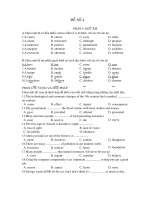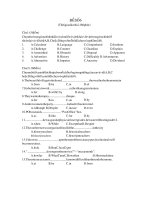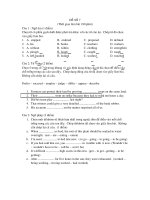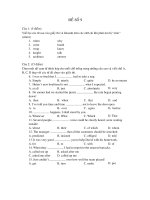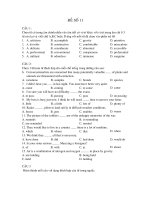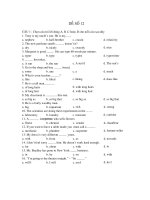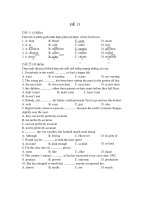- Trang chủ >>
- Đề thi >>
- Đề thi lớp 10
de thi thu dai hoc mon anh
Bạn đang xem bản rút gọn của tài liệu. Xem và tải ngay bản đầy đủ của tài liệu tại đây (165.09 KB, 19 trang )
<span class='text_page_counter'>(1)</span>ðÁP ÁN ðỀ THI THỬ ðẠI HỌC THÁNG 3 – 2013 I. CHỨC NĂNG GIAO TIẾP Nội dung câu hỏi Chọn từ/ cụm từ thích hợp ñể hoàn thành câu sau: Mark: “ I’d like to try on these shoes, please” Salesgirl: “________” A.By all means, sir B. That’s right, sir C. Why not D.I'd love to Chọn từ/ cụm từ thích hợp ñể hoàn thành câu sau: Bill: “Can I get you another drink?” Ann: “_________” A.Forget it B. No, it isn’t C. No, I’ll think it over D.Not just now Chọn từ/ cụm từ thích hợp ñể hoàn thành câu sau: Liz: “Thanks for the nice gift you brought to us” Jenny: “___________” A.Alright. Do you know how much it costs? B. Not at all. Don’t mention it. C. Actually speaking, I myself don’t like it. D.Welcome! It’s very nice of you. Chọn từ/ cụm từ thích hợp ñể hoàn thành câu sau: Ben: “__________” Jane: “ Never mind” A.Congratulations! How wonderful! B. Sorry for staining your carpet. Let me have it. đáp án A. Giải thích (ñối với câu khó). D. B. B. Học sinh sẽ bị nhầm lẫn ñáp án “Welcome! It’s very nice of you.”. Tuy nhiên ñáp án ñúng phải là “Not at all. Don’t mention it.” Với nghĩa “Không ñáng gì ñâu. ðừng ñể ý.”.
<span class='text_page_counter'>(2)</span> cleaned. C. Thank you for being honest with me. D.Would you mind going to dinner next Sunday? Chọn từ/ cụm từ thích hợp ñể hoàn thành câu sau: Margaret: “Could you open the window, please?” Henry: “____________” A.I am, of course B. Yes, with pleasure C. I feel sorry D.Yes, I can. B. II. KỸ NĂNG ðỌC Nội dung câu hỏi đáp án Giải thích (ñối với câu khó) Read the following passage and mark the letter A, B, C or D to indicate the correct answer to fulfill the following blanks . CROCODILES Crocodiles see well, their eyes are equipped with three eyelids, each having a different function. Their eyeballs slide (1) ________ out of harm’s way during an attack. Should they lose one of their eight-centimeter long teeth, a replacement is always ready. A crocodile may go (2) ________ several thousand teeth during a lifetime of over seventy years. Crocodiles (3) ________ chew as their teeth are designed only to penetrate and hold. These animals can attack at any time of the year, but they are more active in the warmer months and when in (4) ________ of mates. Under water, crocodiles choose their (5) ________ at the water’s edge by sensing any movement in the water. Once they have a hold on their victims, they drag it deep into the water to (6) ________ .They then crush and swallow it. Many battles occur over mates. About six weeks after mating the female makes a nest, often on a river (7) ________ , and lay about fifty eggs. She then seals the nest for protection and also as a way of controlling the (8) ________ . After ten to twelve weeks the baby crocodiles come out of the eggs: only one percent of these make it to (9) ________ , as thousands die in flooding or are eaten by fish or bigger crocodiles. In an attempt to ensure a source of healthy animals, crocodile (10) ________ have been set up, and a vast industry now exists in crocodile skin and meat. 1. A. back. B. forward. C. after. D. behind.
<span class='text_page_counter'>(3)</span> 2. A. up. B. out. C. on. D. through. 3. A. couldn’t. B. will not be able to. C. cannot. D. would not. 4. A. discovery. B. search. C. exploration. D. hunt. 5. A. victims. B. survivor. C. weak animals. D. partners. 6. A. sink. B. drown. C. capsize. D. soak. 7. A. edge. B. border. C. side. D. bank. 8. A. weather. B. temperature. C. climate. D. heat. 9. A. baby. B. childhood. C. adulthood. D. youth. 10. A. fields. B. paddies. C. areas. D. farms. Crocodiles see well, their eyes are equipped with three eyelids, each having a different function. Their eyeballs slide (1) ________ out of harm’s way during an attack. a. Should they lose one of their eight-centimeter long teeth, a replacement is always ready. A crocodile may go (2) {#2} several thousand teeth during a lifetime of over seventy years. Crocodiles (3) {#3} chew as their teeth are designed only to penetrate and hold These animals can attack at any time of the year, but they are more active in the warmer months and when in (4) {#4} of mates. Under water, crocodiles choose their (5) {#5} at the water’s edge by sensing any movement in the water. Once they have a hold on their victims, they drag it deep into the water to (6) {#6}. They then crush and swallow it. Many battles occur over mates. About six weeks after mating the female makes a nest, often on a river (7) {#7},. 1. A.. Slide back: trượt ra sau. 2. D. A crocodile may go through several thousand teeth...: Một con cá sấu có thể thay vài nghìn cái răng.... 3. C 4. B. when in search of mates: trong khi tìm kiếm bạn tình. 5. A 6. B. Drown: chết ñuối. 7. D. River bank: bờ sông.
<span class='text_page_counter'>(4)</span> and lay about fifty eggs. She then seals the nest for protection and also as a way of 8. B controlling the (8) {#8}. After ten to twelve weeks the baby crocodiles come out of 9. C Only one percent of these make it to adulthood, as thousands die in flooding or eaten by fish ỏ bigger crocodiles ...: chỉ 1% trong số ñó the eggs: only one percent of these make it to (9) {#9}, as thousands die in flooding or are eaten by fish or bigger trưởng thành, vì hàng nghìn con cá sấu con khác chết hoặc bị nước crocodiles. cuốn trôi hoặc bị cá hay cá sấu to hơn ăn thịt... In an attempt to ensure a source of healthy animals, 10. D Farm: khu nuôi thủy sản (crocodile farm: khu nuôi cá sấu) crocodile (10) {#10} have been set up, and a vast industry now exists in crocodile skin and meat. Read the following passage and mark the letter A, B, C or D to indicate the correct answer for each of the questions. Very few people in the modern world obtain their food supply by hunting and gathering in the natural environment surrounding their homes. This method of harvesting from nature’s provision is the oldest known subsistence strategy and has been practiced for at least the last two million years. It was, indeed, the only way to obtain food until rudimentary farming and the domestication of wild animals were introduced about 10,000 years ago. Because hunter-gatherers have fared poorly in comparison with their agricultural cousins, their numbers have dwindled, and they have been forced to live in marginal environments, such as deserts and arctic wastelands. In higher latitudes, the shorter growing seasons have restricted the availability of plant life. Such conditions have caused a greater dependence on hunting, and on fishing along the coasts and waterways. The abundance of vegetation in the lower latitudes of the tropics, on the other hand, has provided a greater opportunity for gathering a variety of plants. In short, the environment differences have restricted the diet and have limited possibilities for the development of subsistence societies. Contemporary hunter-gatherers may help us understand our prehistoric ancestors. We know from the observation of modern hunter-gatherers in both Africa and Alaska that a society based on hunting and gathering must be very mobile. While the entire community camps in a central location, a smaller party harvests the food within a reasonable distance from the camp. When the food in the area has become exhausted, the community moves on to exploit another site. We also notice seasonal migration patterns evolving for most hunter-gatherers, along with a strict division of labor between the sexes. These patterns of behavior may be similar to those practiced by mankind during the Paleolithic Period. Question 1: The word “domestication” in the first paragraph 1. D Domestication: sự thuần hóa – D: làm cho ñộng vật hoang dã quen với mostly means ________ . việc sống cùng và làm việc cho con người. A. adapting animals to suit a new working environment B. hatching and raising a new species of wild animals in the.
<span class='text_page_counter'>(5)</span> home C. teaching animals to do a particular job or activity in the home D. making wild animals used to living with and working for humans Question 2: According to the passage, subsistence societies depend mainly on ________. A. hunter-gatherers’ tools B. nature’s provision C. farming methods D. agricultural products Question 3: The word “marginal” in the second paragraph is closest in meaning to “________”. A. disadvantaged B. suburban C. forgotten D. abandoned Question 4: In the lower latitudes of the tropics, huntergatherers ________. A. can free themselves from hunting B. have better food gathering from nature C. live along the coasts and waterways for fishing D. harvest shorter seasonal crops Question 5: According to the passage, studies of contemporary subsistence societies can provide a ________. A. further understanding of prehistoric times B. broader vision of prehistoric natural environments C. further understanding of modern subsistence societies D. deeper insight into the dry-land farming Question 6: The word “conditions” in the second paragraph. 2. B. Thông tin tại: This method of harvesting from nature’s provision is the oldest known subsistence strategy and has been practiced for at least the last two million years.. 3. A. Marginal: khó trồng trọt, trồng trọt không có lợi = A: disadvantage: không thuận lợi. 4. B. Thông tin tại: The abundance of vegetation in the lower latitudes of the tropics, on the other hand, has provided a greater opportunity for gathering a variety of plants.. 5. A. Thông tin tại: Contemporary hunter-gatherers may help us understand our prehistoric ancestors.. 6. C. Thông tin tại: “In higher latitudes, the shorter growing seasons have.
<span class='text_page_counter'>(6)</span> refers to ________. A. the places where plenty of animals and fish can be found B. the situation in which hunter-gatherers can grow some crops C. the environments where it is not favorable for vegetation to grow D. the situations in which hunter-gatherers hardly find anything to eat Question 7: A typical feature of both modern and prehistoric 7. D hunter-gatherers is that ________. A. they live in the forests for all their life B. they don’t have a health and balanced diet C. they don’t have a strong sense of community D. they often change their living places 8. B Question 8: According to the passage, which of the following is NOT mentioned? ________ A. Harvesting from the natural environment had existed long before farming was taken up. B. The environment differences produce no effect on subsistence societies. C. The number of hunter-gatherers decreases where farming is convenient. D. Hunting or fishing develops where there are no or short growing seasons. Question 9: According to the author, most contemporary and 9. B prehistoric hunter-gatherers share ________. A. some methods of production B. some patterns of behavior C. some restricted daily rules D. only the way of duty division. restricted the availability of plant life. Such conditions have caused a greater dependence on hunting, and on fishing along the coasts and waterways.”. Thông tin tại: We also notice seasonal migration (di cư theo mùa) patterns evolving for most hunter-gatherers, along with a strict division of labor between the sexes. These patterns of behavior may be similar to those practised by mankind during the Paleolithic Period.. Thông tin tại: We also notice seasonal migration patterns evolving for most hunter-gatherers, along with a strict division of labor between the sexes. These patterns of behavior may be similar to those practised by mankind during the Paleolithic Period..
<span class='text_page_counter'>(7)</span> Question 10: Which of the following would serve as the best 10. A title of the passage? ________ A. Hunter-gatherers and Subsistence Societies B. Evolution of Human’s Farming Methods C. A Brief History of Subsistence Farming D. Hunter-gatherers: Always on the Move Read the following passage and mark the letter A, B, C, or D on your answer sheet to indicate the correct answer for each of the questions from 1 to 10 Increasing numbers of parents in the U.S. are choosing to teach their children at home. In fact, the U.S. Department of Education has estimated that in 1999, about 850,000 children were being home-schooled. Some educational experts say that the real number is double this estimate, and the ranks of home-schooled children seem to be growing at the average rate of about eleven percent every year. At one time, there was a theory accounting for homeschooling: it was traditionally used for students who could not attend school because of behavioral or learning difficulties. Today, however, more parents are taking on the responsibility of educating their own children at home due to their dissatisfaction with the educational system. Many parents are unhappy about class size, as well as problems inside the classroom. Teacher shortages and lack of funding mean that, in many schools, one teacher is responsible for thirty or forty students. The children are, therefore, deprived of the attention they need. Escalating classroom violence has also motivated some parents to remove their children from school. Although there have been a lot of arguments for and against it, homeschooling in the U.S. has become a multimillion dollar industry, and it is growing bigger and bigger. There are now plenty of websites, support groups, and conventions that help parents protect their rights and enable them to learn more about educating their children. Though once it was the only choice for troubled children, homeschooling today is an accepted alternative to an educational system that many believe is failing. Question 01: The number of parents who want to teach their 1. C Thông tin tại: Increasing numbers of parents in the U.S. are choosing own children in the U.S. is ________. to teach their children at home. A. remaining unchanged B. remaining the same C. going up D. going down Question 02: The past participle “homeschooled” in the first 2. A.
<span class='text_page_counter'>(8)</span> paragraph is best equivalent to “________ at home”. A. taught B. self-learned C. untaught D. self-studied Question 03: This estimated number was presented by ________. A. a governmental office B. school teachers C. the parents D. homeschooled children Question 04: According to some experts, the exact number of homeschooled children then must be ________. A. 1,600,000 B. 850,000 C. 1,900,000 D. 1,700,000 Question 05: The closest synonym of the participle phrase “accounting for” in the second paragraph is “________”. A. explaining B. reasoning C. counting for D. calculating documents of Question 06: More parents teach their children because they completely ________ the current educational system. A. please with B. object to C. appeal to D. approve of. 3. A. the U.S. Department of Education. 4. D. the U.S. Department of Education has estimated that in 1999, about 850,000 children were being home-schooled. Some educational experts say that the real number is double this estimate. 5. A. 6. B. Thông tin tại: Today, however, more parents are taking on the responsibility of educating their own children at home due to their dissatisfaction with the educational system. Many parents are unhappy about class size, as well as problems inside the classroom. Teacher shortages and lack of funding mean that, in many schools, one teacher is responsible for thirty or forty students. The children are, therefore, deprived of the attention they need. Escalating classroom violence has.
<span class='text_page_counter'>(9)</span> Question 07: The noun “dissatisfaction” in this paragraph is best equivalent to “________”. A. disappointment B. disagreement C. discrimination D. discouragement Question 08: Many parents stop their children from going to school because it is now too ________ for them. A. explosive B. expensive C. dangerous D. humorous Question 09: The word “arguments” at the beginning of the third paragraph can be best replaced by “________”. A. rows B. quarrels C. viewpoints D. discussions Question 10: The attitude of the author towards homeschooling can be best described as ________. A. acceptable B. favorable C. remarkable D. unfavorable. 7. A. also motivated some parents to remove their children from school. Object to: phản ñối Dissatisfaction: không hài lòng = A. disappointment: thất vọng. 8. C. Thông tin tại: Escalating classroom violence has also motivated some parents to remove their children from school.. 9. C. Argument: lý lẽ, lý luận = viewpoint: quan ñiểm. 10. B. Favorable: tán thành.. III. KỸ NĂNG VIẾT Nội dung câu hỏi. đáp án. Giải thích (câu hỏi khó).
<span class='text_page_counter'>(10)</span> Chọn câu có nghĩa gần nhất với câu cho sẵn sau ñây: He received good education from an early age. A.When he was young he carried on with good education. B. He was well brought up when he was young. C. The younger he was the better educated he was. D.Good education resulted in his active youth. Chọn câu có nghĩa gần nhất với câu cho sẵn sau ñây: You'd better reduce the amount of fat you take in every day. A.You should eat more fat every day. B. The amount of fat you take in is reduced well. C. You ought to cut down on the amount of your everyday fat intake. D.lt is better for you to eat as much fat as you can every day. Chọn từ/cụm từ có gạch chân cần phải sửa trong câu sau: The teacher in charge is angry for his students because of their laziness. A.in charge B. angry for C. because of D.laziness Chọn câu có nghĩa gần nhất với câu cho sẵn sau ñây: Don't you think you have gained some weight? A.Are you getting on well with your weight? B. You have put on some weight, haven't you? C. You shouldn't think about your weight, OK? D.Don't you think weight is something you have gained? Chọn câu có nghĩa gần nhất với câu cho sẵn sau ñây: We can't put up with the noise any longer. A.We really can't tolerate the noise any longer. B. The noise is longer than what we can think about. C. We can't make noise much longer. D.We are not able to stop the noise any longer.. B. C. B. B. A.
<span class='text_page_counter'>(11)</span> Chọn câu có nghĩa gần nhất với câu cho sẵn sau ñây: Her mother is the most warm-hearted person I've known. A.I've never known a more warm-hearted person than her mother. B. I don't know a more warm-hearted person than her mother. C. I did not know a more warm-hearted person than her mother. D.I had never known a more warm-hearted person than her mother. Chọn từ/cụm từ có gạch chân cần phải sửa trong câu sau: That day when I first met her then is still on my mind. A.That day B. first met C. then D.on my mind Chọn từ/cụm từ có gạch chân cần phải sửa trong câu sau: He was the last one leaving the burning buildings in time. A.one B. leaving C. burning buildings D.in time Chọn từ/cụm từ có gạch chân cần phải sửa trong câu sau: The spectators left at halftime although they felt so bored with the match. A.The B. at halftime C. although D.bored with Chọn từ/cụm từ có gạch chân cần phải sửa trong câu sau: During the 1700s, Philadelphia developed into the most wealthy city in the American colonies. A.During B. developed into C. most wealthy. A. C. B. C. C. Trong câu ñã dùng trạng từ “when” thì không dùng “then” nữa..
<span class='text_page_counter'>(12)</span> D.American colonies Chọn câu ñúng: John / encourage / I / apply /job. A.John encouraged me to apply for the job. B. John encouraged I to apply for the job. C. John encouraged me to applying for the job. D.John encouraged me apply for the job. Chọn câu ñúng: The / door / too / heavy / child / push / open. A.The door were too heavy for the child to push open. B. The door was too heavy of the child to push open. C. The door was too heavy for the child to push open. D.The door was too heavy for the child to pushing open. Chọn câu trả lời ñúng: Mary / interested / collect / dolls / foreign countries. A.Mary is interested in collecting dolls from foreign countries. B. Mary is interested on collecting dolls from foreign countries. C. Mary is interested about collecting dolls from for countries. D.Mary is interested with collecting dolls from foreign countries. Chọn câu ñúng: He / suggest / put / luggage / seat. A.He suggested to put my luggage under the seat. B. He suggested to putting my luggage under the seat. C. He suggested that putting my luggage under the seat. D.He suggested putting my luggage under the seat. Chọn câu ñúng: We / not / arrive / time / see the first film. A.We didn't arrive in time to see the first film. B. We didn't arrive on time to see the first film. C. We didn't arrive in time to seeing the first film.. A. C. A. D. A.
<span class='text_page_counter'>(13)</span> D.We didn't arrive on time to seeing the first film. IV. NGỮ ÂM Nội dung câu hỏi Chọn từ có trọng âm chính nhấn vào âm tiết có vị trí khác với ba từ còn lại: A.interesting B. surprising C. amusing D.successful Chọn từ có trọng âm chính nhấn vào âm tiết có vị trí khác với ba từ còn lại: A.vegetable B. comfortable C. generation D.graduate Chọn từ có trọng âm chính nhấn vào âm tiết có vị trí khác với 3 từ còn lại: A.simultaneous B. feedback C. different D.error Chọn từ có trọng âm chính nhấn vào âm tiết có vị trí khác với 3 từ còn lại: A.efficient B. deficient C. ancient D.sufficient Chọn từ có trọng âm nhấn vào âm tiết thứ nhất khác với 3 từ còn lại: A.suppose B. commuter C. fortunate D.confused. đáp án A. C. A. C. C. Giải thích (câu hỏi khó).
<span class='text_page_counter'>(14)</span> V. NGỮ PHÁP, TỪ VỰNG Nội dung câu hỏi Chọn ñáp án ñúng ñể hoàn thành câu sau ñây: By the time you receive this letter, I...............for Japan. A.will leave B. have left C. would have left D.will have left Chọn phương án thích hợp ñể hoàn thành câu sau: Cinema-goers ..............to buy their tickets in advance. A.advise B. are advised C. have advised D.will be advised Chọn từ/tổ hợp từ thích hợp ñể hoàn thành câu sau: I missed the train …..........…. catch to work. A.which usually B. that usually C. usually for me D.I usually Chọn từ/cụm từ có nghĩa gần với từ gạch chân nhất: . The introduction of appropriate farming practices to Vietnam farmers can help them achieve a higher output. A.productivity B. renovation C. guideline D.achievement Chọn từ/cụm từ thích hợp ñể hoàn thành câu sau: This development project could be of great help to the _______ Vietnamese. đáp án D. B. D. A. C. Giải thích (câu hỏi khó).
<span class='text_page_counter'>(15)</span> population. A.major B. living C. rural D.domestic Chọn từ/cụm từ thích hợp ñể hoàn thành câu sau: After more than a decade of Doi Moi or economic _______, the Vietnamese Communist government has achieved diplomatic and economic links with numerous foreign partners. A.relation B. investment C. productivity D.renovation Chọn ñáp án ñúng ñể hoàn thành câu sau ñây: I don't remember ...............the front door when I left home this morning. A.to lock B. locking C. locked D.to have locked Chọn từ/tổ hợp từ thích hợp ñể hoàn thành câu sau: Nothing I .................about it. A.can do B. can be done C. can't be done D.be able to do Chọn phương án thích hợp ñể hoàn thành câu sau: Neither the table nor the chairs ....................here. A.does B. do C. is. D. B. A. D.
<span class='text_page_counter'>(16)</span> D.are Chọn ñáp án ñúng ñể hoàn thành câu sau ñây: Susan couldn't help .............at the fat man. A.to laugh B. laughed C. for laughing D.laughing Chia ñộng từ trong ngoặc dưới ñây ở dạng nguyên thể hoặc danh ñộng từ. You still have a lot (learn).........if you forgive my (say)................so. A.learning/to say B. learning/saying C. to learn/saying D.to learn/to say Chọn từ/cụm từ thích hợp ñể ñiền vào chỗ trống: My uncle took……. golf when he retired from work. A.up B. over C. on D.after Chọn từ/cụm từ thích hợp ñể hoàn thành câu sau: Health and happiness are............................... things in life. A.the most important B. the more important C. the much important D.the important Chọn từ/cụm từ thích hợp ñể ñiền vào chỗ trống: That song……….…me of my childhood. A.recalls B. reminds C. remembers. D. C. A. A. B.
<span class='text_page_counter'>(17)</span> D.recollects Chọn từ/cụm từ thích hợp ñể ñiền vào chỗ trống: She .................... herself up in her blanket. A.packed B. rolled C. wound D.hid Chọn từ/cụm từ thích hợp ñể ñiền vào chỗ trống: The doctor told me he could ................... nothing wrong with my health. A.bring B. find C. gain D.obtain Chọn từ/cụm từ thích hợp ñể ñiền vào chỗ trống: I will agree to it only on the .................... that we share the expense. A.consent B. approval C. opinion D.understanding Chọn từ/cụm từ thích hợp ñể ñiền vào chỗ trống: The homeless couple.................. at last in finding a flat to rent. A.enabled B. managed C. succeeded D.reached Chọn phương án thích hợp ñể hoàn thành câu sau: Unemployment .................... by the government. A.must being dealt with B. must be dealt with C. must be dealed with. B. B. D. On the understanding that: trong ñiều kiện là, với thỏa thuận là.... C. Succeed in doing something: thành công trong việc gì. Các ñáp án khác: enable somebody to do something; manage to do something; “reach” không ñi với “in”.. B.
<span class='text_page_counter'>(18)</span> D.must be deal with Chọn từ/cụm từ thích hợp ñể ñiền vào chỗ trống: The film has lasted for more than 1 hour, I know it ................... in a few seconds. A.will be ended B. ends C. is going to end D.is ended Chọn từ/cụm từ thích hợp ñể ñiền vào chỗ trống: Only because she had to support her family .......... to leave school. A.that Alice decides B. did Alice decide C. does Alice decide D.Alice decided Chọn từ/cụm từ thích hợp ñể hoàn thành câu sau: If you want to develop inner tranquility, you have to stop...........by every little thing that happens. A.bothering B. to bother C. being bothered D.to be bothered Chọn phương án thích hợp ñể hoàn thành câu sau: A number of graduates ..................scholarships from this department. A.have received B. has received C. are received D.receives Chia ñộng từ trong ngoặc: Then about a year ago he (disappear) and I (never,hear) from him since. A.have disappeared - have never heard. C. Ở ñây phải dùng thì tương lai và ở thể chủ ñộng. “Bộ phim ñã kéo dài hơn 1 giờ rồi. Tôi biết nó sẽ kết thúc trong vài giây nữa.”. B. “Only” ñược ñặt ở ñầu câu nên câu ñược viết ở dạng ñảo ngữ: phải ñặt trợ ñộng từ ñược chia theo thì tương ứng lên trước chủ ngữ.. C. Stop + V_ing: dừng việc gì lại; ở ñây phải chia ở dạng bị ñộng: Nếu bạn muốn tĩnh tâm thì bạn phải dừng việc bị làm phiền bởi những ñiều nhỏ nhặt ñang diễn ra.. C. D.
<span class='text_page_counter'>(19)</span> B. had disappeared - never heard C. disappeared - never heard D.disappeared - have never heard Chọn từ/ cụm từ thích hợp ñể hoàn thành câu sau: Living organisms contain more water ........................ substance. A.than do any other B. does than any other C. other than do they any D.than they do any other. D.
<span class='text_page_counter'>(20)</span>

